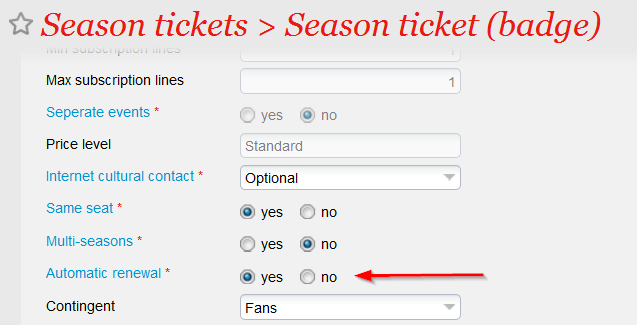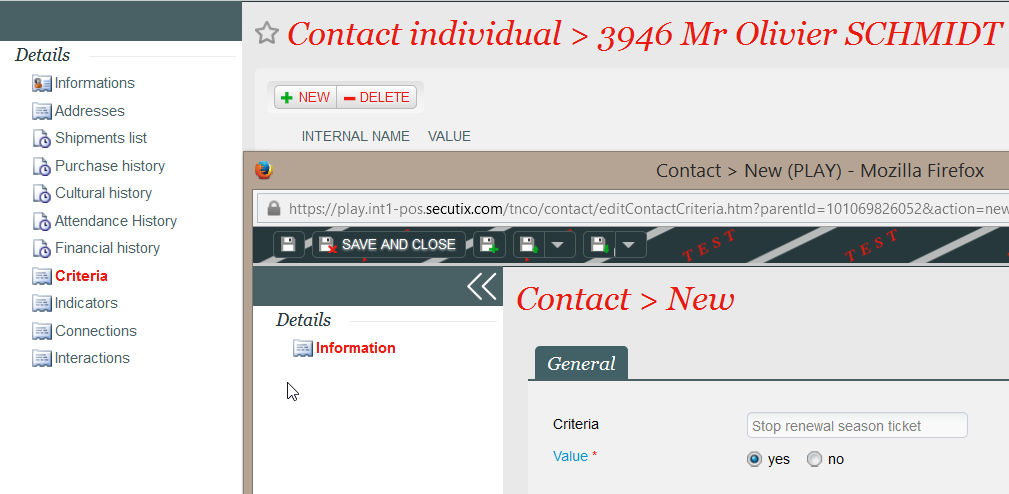Until now, SecuTix had a season-to-season automatic season ticket renewal feature. This process generated reservation orders and online visitors could pay for their reservation from their personal area in online sales.
This feature is still available in Piz Bernina V2. However, it's now possible to pay for season tickets automatically when the renewal date comes around. So season ticket holders no longer need to log into their personal area to pay for their season ticket.
Configuration
When creating season tickets you can choose whether or not they should be automatically renewed.
If the Automatic renewal radio button is selected, payment will be taken for the season ticket automatically unless the season ticket holder has cancelled automatic extension. (See cancellation process described in more detail below).
If the radio button is not selected, the renewal process behaves exactly as it does today. In other words it creates a reservation without automatic payment.
Automatic payment
The new season ticket will be paid using the same method as for the previous season. The following payment methods are supported:
IMPORTANT
Automatic renewal, with or without payment, is always executed using the same batch function, which you can activate from 'Tools > Batch programs > Schedule'.
- Direct debit with our partner Slimpay: new payments reuse bank details, the Unique Mandate Reference (UMR) and the number of instalments for the initial payment. Due dates and amounts are calculated based on how the payment method is parametrised.
- Payment by credit card instalment: the credit card information must be available via an alias. The number of instalments is taken from the initial payment. Due dates and amounts are calculated based on how the payment method is parametrised.
- If the season ticket from the previous season was paid by another method, it's possible to pay for the new season ticket using the payment contact alias. Obviously, this type of payment is not possible unless the contact has saved an alias.
Shipment mode
The renewal feature allows you to select:
- A set of available shipment modes
- A fallback shipment mode
To specify the shipment mode, proceed as follows:
- Reuse the shipment mode from the previous season if it is defined in the available shipment modes list.
- If this shipment mode has not been defined in the list, select the new mode suggested in the list (see examples below)
- If you're unable to identify a previous shipment mode or if several are possible (for example, because duplicates were issued when a season-ticket card was lost), use the fallback mode
Example of possible shipment mode changes:
- The season ticket for the previous season was printed and sent on a new card. The new season ticket is loaded on the existing card.
- The season ticket for the new season is designed for home printing of individual tickets (whereas the one for the previous season was loaded on a card).
What to do if there's an error
Automatic season-ticket payment may not be possible if there is no alias available or no fallback shipment mode has been defined. In the batch execution parameters you can choose one of the following courses of action:
- Don't create an order at all (no sale, no reservation)
- Create a reservation
IMPORTANT
To create sales orders automatically, it's essential to specify the available shipment modes and the fallback mode.
Season ticket cancellation
Season ticket holders can cancel their season ticket (in other words, cancel automatic extension) by contacting the institution. Depending on the contact criterion setup they could do this via their personal area or if not visible on internet and as below , operators need to add the contact criterion 'Stop renewal season ticket' to the relevant contact.
Cancellation only affects automatically renewed season tickets. Setting 'Stop renewal season ticket' to 'yes' means that no sales orders or reservations will be created. This criterion needs to be specified in the batch execution parameters. This mechanism allows you to manage the renewal of multiple season tickets separately. Where this is the case, simply create a criterion per season ticket (e.g. 'Stop season-ticket 1', 'Stop season-ticket 2'). If the season-ticket holder only wants to cancel ticket 1, the operator initialises the corresponding criterion. When the renewal batch starts, make sure that the criterion corresponding to the season ticket for renewal is flagged.
When a contact A buys several season tickets, e.g. for himself and contacts B and C, there are two possible cancellation scenarios:
- If contact A cancels his season ticket, this will also cancel those for B and C. SecuTix applies a 'who pays decides' principle.
- If contact B (or C) cancels their season ticket, the others will be unaffected

